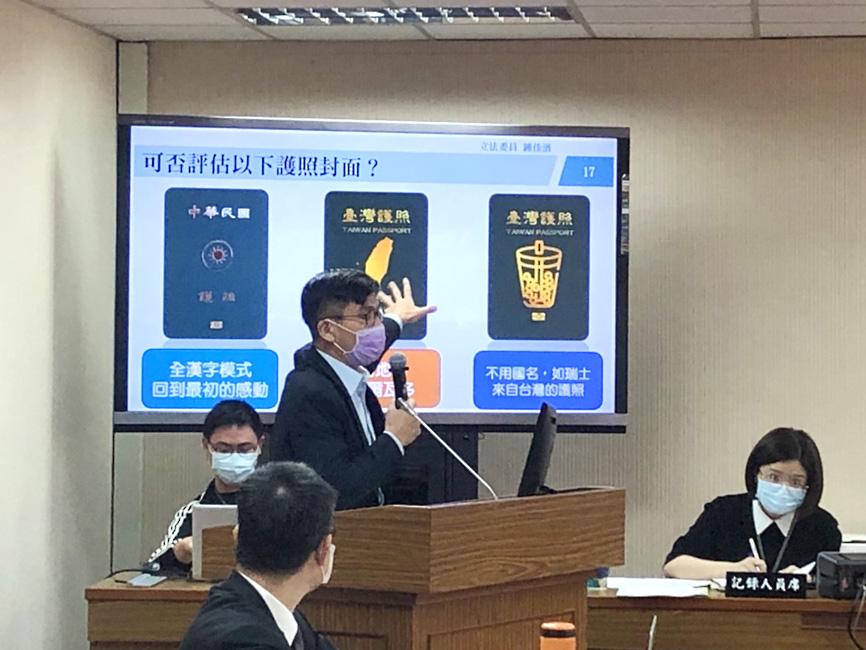Democratic Progressive Party Legislator Chung Chia-pin (鍾佳濱) yesterday unveiled three design proposals for a revised passport cover, at a meeting of the Legislative Yuan’s Foreign Affairs and National Defense Committee in Taipei.
The proposals were in response to a debate about whether to emphasize “Taiwan” and de-emphasize “China” in the wording on the cover.
Chung proposed designs including one with no English wording at all, which keeps the overall design of the current passport.

Photo: Lu Yi-hsuan, Taipei Times
Another replaced the national emblem with a map of the main island of Taiwan, and had the words “Taiwan Passport” in large lettering at the top and “Republic of China” in smaller lettering at the bottom, both in Chinese and English.
A third design replaced the national emblem with an image of a cup of bubble tea and had only the words “Taiwan Passport” in Chinese and English.
During the meeting, which was attended by officials from the Ministry of Foreign Affairs, Chung said that the use of the word “China” on the passport had caused problems for Taiwanese traveling abroad, as they have been mistaken for Chinese nationals.
Asked whether the Bureau of Consular Affairs had received any complaints about the current passport, bureau Director-General Phoebe Yeh (葉非比) said that the bureau receives about 10 complaints per year.
Neither the National Emblem Act (中華民國國徽國旗法), nor the Enforcement Rules of the Passport Act (護照條例施行細則) stipulate that the passport must display the national emblem, Chung said.
However, the Enforcement Rules of the Passport Act does prohibit individual passport owners from modifying the graphics in their passports or adding new graphics without authorization, he added.
Asked whether the ministry has the authority to change the cover of the passport, Deputy Minister of Foreign Affairs Hsu Szu-chien (徐斯儉) said: “That should be the case.”
Chung said that there was no need to have the nation’s name written in English or a national symbol on the cover of the passport, citing examples from countries like Germany and Switzerland, which have English only for the word “passport,” and France, which has no English on its passport cover at all.
Similarly, the Salvadorean passport has only Spanish on its cover and a map of the region, and the Republic of Guinea passport has only French and the emblem for the Economic Community of West African States, of which it is a member, he said.
Of the 156 non-English-speaking countries worldwide, 71 do not display English-language names for their countries on their passport covers, Chung said, adding that the nation’s earliest passports had only Chinese characters on their covers.
Changing the passport design would require public consensus, Hsu said.
Responding to a comment by Chung that passports could be revised any year, as the ministry needs to print new passports annually, Yeh said that the ministry still has 600,000 passports left over from last year, as people are not traveling because of the COVID-19 pandemic.

POSITIVE DEVELOPMENT: Japan and the US are expected to hold in-depth discussions on Taiwan-related issues during the meeting next month, Japanese sources said The holding of a Japan-US leaders’ meeting ahead of US President Donald Trump’s visit to China is positive news for Taiwan, former Japan-Taiwan Exchange Association representative Hiroyasu Izumi said yesterday. After the Liberal Democratic Party’s landslide victory in Japan’s House of Representatives election, Japanese Prime Minister Sanae Takaichi is scheduled to visit the US next month, where she is to meet with Trump ahead of the US president’s planned visit to China from March 31 to April 2 for a meeting with Chinese President Xi Jinping (習近平). Japan and the US are expected to hold in-depth discussions on Taiwan-related issues during the

‘LIKE-MINDED PARTNER’: Tako van Popta said it would be inappropriate to delay signing the deal with Taiwan because of China, adding he would promote the issue Canadian senators have stressed Taiwan’s importance for international trade and expressed enthusiasm for ensuring the Taiwan-Canada trade cooperation framework agreement is implemented this year. Representative to Canada Harry Tseng (曾厚仁) in an interview with the Central News Agency (CNA) said he was increasingly uneasy about Ottawa’s delays in signing the agreement, especially as Ottawa has warmed toward Beijing. There are “no negotiations left. Not only [is it] initialed, we have three versions of the text ready: English, French and Mandarin,” Tseng said. “That tells you how close we are to the final signature.” Tseng said that he hoped Canadian Prime Minister Mark Carney

President William Lai (賴清德) yesterday bestowed one of Taiwan’s highest honors on Saint Vincent and the Grenadines (SVG) Ambassador Andrea Clare Bowman in recognition of her contributions to bilateral ties. “By conferring the Order of Brilliant Star with Grand Cordon on Ambassador Bowman today, I want to sincerely thank her, on behalf of the Taiwanese people, for her outstanding contribution to deepening diplomatic ties between Taiwan and SVG,” Lai said at a ceremony held at the Presidential Office in Taipei. He noted that Bowman became SVG’s first ambassador to Taiwan in 2019 and

A man walks past elementary school artworks at the Taipei Lantern Festival in Ximen District yesterday, the first day of the event. The festival is to run from 5pm to 10pm through March 15.